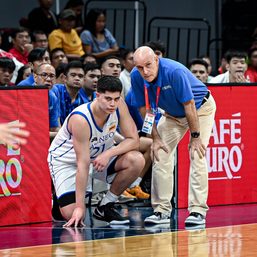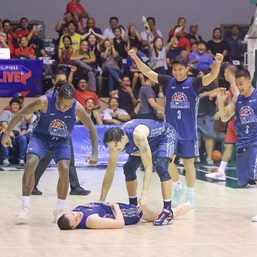SUMMARY
This is AI generated summarization, which may have errors. For context, always refer to the full article.

MOSCOW, Russia (3rd UPDATE) – Russia on Monday, December 23, freed both jailed members of anti-Kremlin punk band Pussy Riot whose imprisonment prompted a wave of global outrage, but one immediately denounced her release as a “PR stunt”.
Both Maria Alyokhina and Nadezhda Tolokonnikova were freed two months early under a Kremlin-backed amnesty after serving most of their two-year sentences.
Alyokhina was quietly whisked away from her prison colony in the city of Nizhny Novgorod while Tolokonnikova emerged in much more public fashion a few hours later from a prison hospital in Krasnoyarsk in Siberia.
The move comes just 3 days after the shock pardoning and liberation of anti-Kremlin tycoon Mikhail Khodorkovsky, which many saw as a bid by President Vladimir Putin to improve Russia’s image ahead of the 2014 Winter Olympics that it is hosting in Sochi in February.
Showing she had lost none of her fighting spirit during her incarceration, Alyokhina used her first interview after her release to slam the amnesty as a mere publicity stunt, and said that she would have preferred to remain in prison.
“I don’t think it’s an amnesty, it’s a profanation,” she told the Dozhd television channel, saying it only applied to a tiny minority of convicts. “I don’t think the amnesty is a humanitarian act, I think it’s a PR stunt.”
“In this situation, I was just a body being moved in space, nothing depended on me,” she said. “If I had a choice to refuse (the amnesty), I would have, without a doubt,” she said.
Whisked away to freedom
Alyokhina’s release was marked by the same kind of security that marked that of Khodorkovsky, who was not seen after his release until he touched down at a Berlin airport on Friday afternoon, December 20.
She was whisked away from the prison without speaking with the media after the highly-anticipated release, her lawyer said.
Her lawyer Irina Khrunova said prison officials drove the 25-year-old out of the penal colony to avoid a media frenzy.
Instead of going home to Moscow, Alyokhina went straight to the local rights NGO Committee Against Torture to discuss rights violations of fellow inmates.
Tolokonnikova, who spent the last part of her sentence in a prison hospital in Siberian city of Krasnoyarsk after a transfer from a notoriously harsh colony in the Mordovia region, finally walked out in the evening to a crush of journalists freezing in temperatures of in minus 20 degrees Celsius.
“Nadya is free!” wrote her husband Pyotr Verzilov on Twitter.
Russia ‘like a prison camp’
Tolokonnikova slammed Russia’s prison system and said that the whole country is built like a penal colony.
“Russia is built on the model of a penal colony and that is why it is so important to change the penal colonies today to change Russia,” Tolokonnikova told journalists after her release. “Penal colonies and prisons are the face of the country.”
She said she and released bandmate Alyokhina will be working on a project focusing on rights of prisoners, using experience of spending a year and 10 months in prison.
“I don’t consider this time wasted,” she said. “I gained unique experience which will make it easier to really engage in human rights work. “I became older, I saw the state from within, I saw this totalitarian machine as it is.”
Addressing journalists, she said her views have not changed since she was arrested in February 2012 for performing a “punk prayer” in Moscow’s Cathedral of Christ the Saviour.
“Prisoners should be treated like normal human beings … not like trash,” she said, specifically mentioning her previous penal colony in Mordovia, where “people were being murdered morally and physically.”
Tolokonnikova spent the majority of her sentence in Mordovia, and in September exposed a litany of abuses in the colony in a public letter.
She said convicts were treated as slave labor, fed rotten food and refused basic facilities or medical care. She declared a hunger strike and was eventually transferred to a different region.
Tolokonnikova said she plans to meet with Alyokhina as soon as possible. “We have a plan to create a human rights organisation that would help political prisoners,” she said.
Rebels with a cause
The pair and fellow activist Yekaterina Samutsevich were convicted on charges of hooliganism motivated by religious hatred after staging the prayer. They later released a video clip of their performance which has now been banned.
The stunt came just ahead of Putin’s re-election to the Kremlin in March 2012 and was aimed at denouncing the Orthodox Church’s support of the Russian strongman during the campaign.
All were arrested in early March 2012. Samutsevich was later freed on appeal with a suspended sentence, but Tolokonnikova and Alyokhina were sent to faraway penal colonies to serve their two-year terms.
Alyokhina and Tolokonnikova, whose sentences would have run out in early March, were granted the amnesty last week after parliament approved a Kremlin-backed bill.
“I’m really happy that she is out,” Samutsevich told Dozhd after Alyokhina’s release.
“If she wants to be involved in human rights activities that is great, but the main thing is that she is fine and healthy,” she added.
Their jailing turned them from little-known feminist punks who staged a handful of guerrilla performances in Moscow to the stars of a global cause celebre symbolizing the repression of civil dissent under Putin.
They received support from luminaries ranging from Madonna to Yoko Ono to Myanmar democracy icon Aung San Suu Kyi.
The case also polarized Russian society, with Orthodox conservatives regularly getting into fights with Pussy Riot supporters during the trial, and even staging rallies of their own.
Alyokhina told Dozhd she had not met a single person in prison who said their religious feelings were hurt by the performance.
If offered to do it over again, “we would sing the song to the end,” she said. “You have to listen to the whole thing, not just the first verse.” – Rappler.com
Add a comment
How does this make you feel?










There are no comments yet. Add your comment to start the conversation.